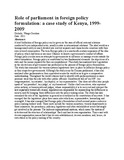| dc.description.abstract | A brief definition of foreign policy can be given as 'the sum of official external relations conducted by an independent actor, usually a state in international relations'. The ideal world as a homogenized entity is much divided into real but separate and characteristic countries with their own revered communities. The term foreign policy is a nineteenth-century expansion of the idea of policy, which had been in use since Chaucer to denote a government's conduct of affairs. Foreign policy is also seen as attempts by governments to influence or manage events outside the state's boundaries. Foreign policy is constituted by two fundamental elements: the objectives of a state and the means required for their accomplishment.
This study has analyzed how Legislature as the elected arm of government has performed in the process of foreign policy formulation .
The study has examined the various systems legislatures have in place to influence foreign policy in their respective governments. Although the study is on the Kenyan parliament, it has also analyzed other parliaments or their equivalent across the world so as to give a comparative understanding. Throughout the world citizens tend to identify with parliamentarians in more personal ways than they do with other public officials. Constituents talk of 'my MP', 'my congressperson', 'my senator', 'my deputy', or 'my representative.' One does not often hear people speak of 'my president', 'my judge', or 'my bureaucrat.' Unlike chief executives, who represent entire nations, or bureaucrats and judges, whose responsibility it is to carry out and interpret the law impartially toward all citizens, legislators are responsible for representing the differences in society, and for bringing these differences into the policy making arena.
The study has also examined the role of the legislature in general as is outlined in the constitution of any state. It has emerged that the legislature plays three main roles which are, representative, lawmaking and oversight. It has also emerged that Foreign policy formulation is built around power-centers or policy making bodies/ units. These units include the various ministries, various departments in those ministries, the presidency, judiciary, legislature and other stakeholders/ actors that might get involved in the process. The units are organizational systems, which mean 'the system of activities and the structure of relationships'. Each unit has its own organization. Thus a unit with its own organization means that it has its own establishment, its own members, and, hence, its own stakes in the policy making of the country. | en_US |

